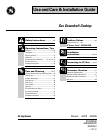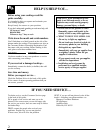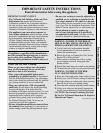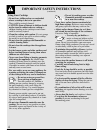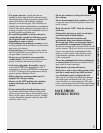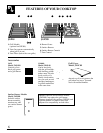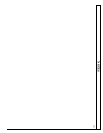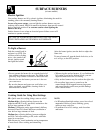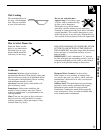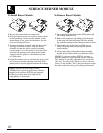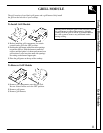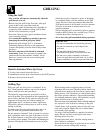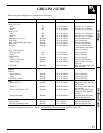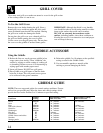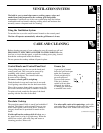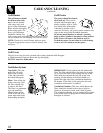
44
IMPORTANT SAFETY INSTRUCTIONS
(continued)
Using Your Cooktop
• Do not leave children alone or unattended
where a cooktop is hot or in operation.
They could be seriously burned.
•
CAUTION: Items of interest to children should
not be stored in cabinets above a cooktop—
children climbing on the cooktop to reach items
could be seriously injured.
• Clean the cooktop with caution. If a wet sponge
or cloth is used to wipe spills on a hot cooktop,
be careful to avoid steam burns.
• Do not clean the cooktop with flammable or
volatile cleaning fluids.
• Do not clean the cooktop when the appliance
is in use.
• Let the burner grates and other surfaces cool
before touching them or leaving them where
children can reach them.
• Never wear loose-fitting or hanging garments
while using the appliance. Be careful when
reaching for items stored in cabinets over the
cooktop. Flammable material could be ignited
if brought in contact with flame or hot surfaces
and may cause severe burns.
• For your safety, never use your appliance for
warming or heating the room. Prolonged use
of the cooktop in this way can be hazardous.
• Do not use water on grease fires.
Never pick up a flaming pan.
Turn the controls off. Smother a
flaming pan on a surface burner by covering
the pan completely with a well-fitting lid,
cookie sheet or flat tray. Use a multi-purpose
dry chemical or foam-type fire extinguisher.
Flaming grease outside a pan can be put out
by covering it with baking soda or, if available,
by using a multi-purpose dry chemical or foam-
type fire extinguisher.
• Do not store flammable materials near the
cooktop. Do not store or use gasoline or other
flammable vapors and liquids in the vicinity of
this or any other appliance.
• Do not let cooking grease or other
flammable materials accumulate
in or near the cooktop.
• Never leave surface burners unattended at
high flame settings. Boilovers cause smoking
and greasy spillovers that may catch on fire.
• Adjust surface burner flame size so it does
not extend beyond the edge of the cookware.
Excessive flame is hazardous.
• Use only dry pot holders—
moist or damp pot holders on hot
surfaces may result in burns from
steam. Do not let pot holders come near open
flames when lifting cookware. Do not use a towel
or other bulky cloth in place of a pot holder.
• To minimize the possibility of burns, ignition
of flammable materials and spillage, turn
cookware handles toward the side or center of
the cooktop without extending over adjacent
burner or vent area.
• Always turn the surface burners to off before
removing the cookware.
• Carefully watch foods being fried at high
flame setting.
• Foods for frying should be as dry as possible.
Frost on frozen foods or moisture on fresh foods
can cause hot fat to bubble up and over the sides
of the pan.
• Use least possible amount of fat for effective
shallow or deep-fat frying. Filling the pan too
full of fat can cause spillovers when food is
added.
• If a combination of oils or fats will be used
in frying, stir together before heating, or as fats
melt slowly.
• Always heat fat slowly, and watch as it heats.
• Use a deep fat thermometer whenever
possible to prevent overheating fat beyond
the smoking point.



